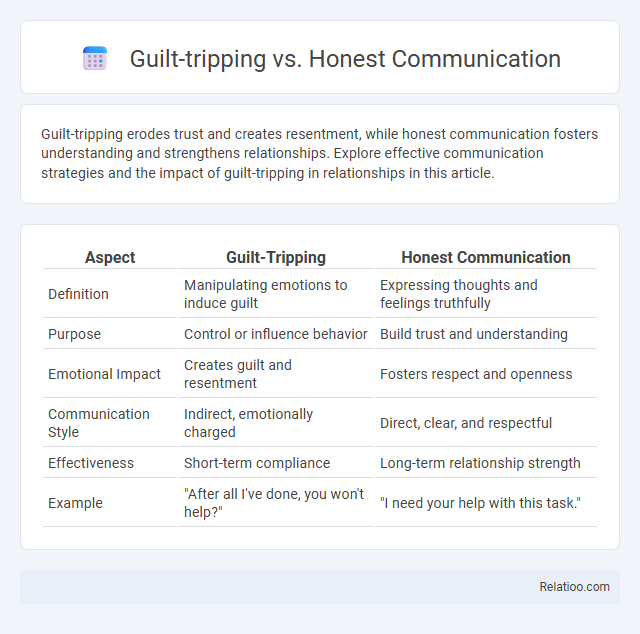Guilt-tripping erodes trust and creates resentment, while honest communication fosters understanding and strengthens relationships. Explore effective communication strategies and the impact of guilt-tripping in relationships in this article.
Table of Comparison
| Aspect | Guilt-Tripping | Honest Communication |
|---|---|---|
| Definition | Manipulating emotions to induce guilt | Expressing thoughts and feelings truthfully |
| Purpose | Control or influence behavior | Build trust and understanding |
| Emotional Impact | Creates guilt and resentment | Fosters respect and openness |
| Communication Style | Indirect, emotionally charged | Direct, clear, and respectful |
| Effectiveness | Short-term compliance | Long-term relationship strength |
| Example | "After all I've done, you won't help?" | "I need your help with this task." |
Understanding Guilt-Tripping: Definition and Examples
Guilt-tripping involves manipulating someone's emotions by making them feel responsible or ashamed to influence their behavior, often leading to resentment and communication breakdowns. Honest communication relies on expressing feelings and concerns transparently without blame, fostering trust and mutual respect in relationships. Your awareness of these differences can help you recognize guilt-tripping tactics and promote healthier, more constructive interactions.
What Is Honest Communication? Key Principles
Honest communication involves expressing your thoughts and feelings openly and respectfully while listening actively to others without judgment or manipulation. Key principles include clarity, sincerity, empathy, and accountability, ensuring that your message fosters understanding rather than guilt or defensiveness. You build trust and strengthen relationships by prioritizing transparency over guilt-tripping tactics that undermine genuine dialogue.
Psychological Impact of Guilt-Tripping
Guilt-tripping manipulates emotions, often leading to increased anxiety, lowered self-esteem, and resentment, whereas honest communication fosters trust and clarity by expressing feelings openly without blame. Your mental well-being benefits when interactions prioritize transparency and respect over emotional manipulation. Understanding these dynamics helps reduce psychological stress and strengthens relationships.
Emotional Benefits of Honest Communication
Honest communication fosters emotional well-being by promoting trust, reducing anxiety, and encouraging authentic connections, unlike guilt-tripping which often causes resentment and emotional distress. By expressing feelings transparently, you create a safe environment for open dialogue, enhancing mutual understanding and empathy. This emotional clarity supports healthier relationships and personal growth compared to the manipulation inherent in guilt-tripping.
Recognizing Signs of Manipulative Guilt
Recognizing signs of manipulative guilt involves identifying patterns where one party frequently induces feelings of shame or responsibility to control or influence others unfairly. Honest communication relies on transparency, empathy, and respect without leveraging guilt to achieve personal goals. Distinguishing between genuine emotional expression and guilt-tripping is crucial for maintaining healthy boundaries and fostering trust in relationships.
Barriers to Practicing Honest Communication
Barriers to practicing honest communication often include fear of conflict, emotional discomfort, and concern over hurting others' feelings, which can lead individuals to resort to guilt-tripping as a manipulative strategy. Guilt-tripping undermines trust and transparency by inducing shame rather than fostering authentic dialogue and mutual understanding. Overcoming these barriers requires cultivating emotional intelligence, active listening skills, and creating a safe environment where open and honest conversations are encouraged.
Guilt-Tripping in Relationships: Consequences and Costs
Guilt-tripping in relationships often leads to emotional manipulation, causing stress and eroding trust between partners. Your emotional well-being may suffer as guilt-tripping creates resentment and diminishes open, honest communication essential for a healthy connection. Recognizing these consequences is crucial for developing healthier interaction patterns that foster respect and mutual understanding.
How Honest Communication Builds Trust
Honest communication establishes a foundation of trust by promoting transparency and emotional authenticity, allowing individuals to express feelings and concerns without fear of manipulation. Unlike guilt-tripping, which often erodes trust by inducing shame and resentment, honest communication fosters mutual respect and understanding, strengthening relational bonds. Consistent honesty encourages open dialogue, reducing misunderstandings and enhancing cooperation in personal and professional relationships.
Strategies to Replace Guilt-Tripping with Honesty
Strategies to replace guilt-tripping with honest communication involve fostering open dialogue and expressing feelings without manipulation. You can prioritize clarity and empathy by articulating your needs directly while respecting the other person's perspective. Building trust requires consistent honesty and avoiding blame, which empowers healthier relationships and more effective problem-solving.
Creating a Culture of Openness: Steps for Positive Change
Creating a culture of openness requires prioritizing honest communication over guilt-tripping, which undermines trust and fosters resentment. Encouraging transparent dialogue helps establish psychological safety, enabling team members to express concerns without fear of blame. Implementing regular feedback sessions and modeling vulnerability promote accountability and constructive interactions, driving positive organizational change.

Infographic: Guilt-tripping vs Honest Communication
 relatioo.com
relatioo.com